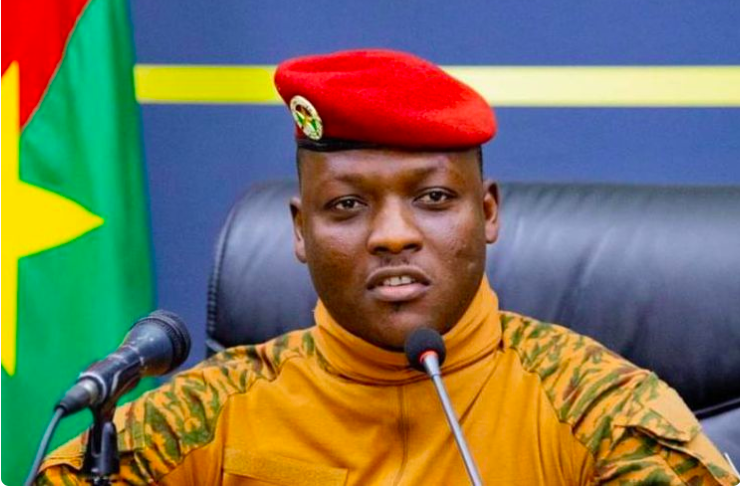Yoruba Nation Backs Burkina Faso’s Ibrahim Traoré as Symbol of African Sovereignty and Anti-Imperialism

Yoruba Nation Declares Support for Burkina Faso’s Ibrahim Traoré, Calls Him a Symbol of African Resistance
The Yoruba Nation, a pan-Yoruba self-determination movement advocating for the independence of the South-West region of Nigeria, has thrown its weight behind Captain Ibrahim Traoré, the military leader of Burkina Faso. In a recent statement, the group hailed Traoré as a “symbol of resistance, unity, and anti-imperialism,” urging African leaders to emulate his bold leadership and pro-African governance model.
A Controversial Yet Influential Figure
Captain Traoré, who rose to power in September 2022 after ousting interim President Paul-Henri Sandaogo Damiba in a coup, has sparked both admiration and criticism across the continent. His government has cut diplomatic ties with former colonial power France and distanced itself from Western influence, instead pursuing partnerships with countries such as Russia, Iran, and Turkey.
While some of his policies and achievements remain unverified, Traoré has gained popularity on social media for what his supporters claim is a fresh, fearless approach to leadership in West Africa—focused on sovereignty, industrialisation, and grassroots empowerment.
Yoruba Nation's Message of Solidarity
In a joint statement signed by Chief Omodunni Ayorinde (Chairman) and Banjo Adewale (Secretary), the Yoruba Nation expressed its full support for Traoré’s leadership, describing him as a beacon of hope in Africa’s broader quest for freedom from neocolonial domination.
“We have observed the developments in Burkina Faso under Captain Traoré and are offering him our full support for his unwavering commitment to African dignity and sovereignty,” the statement read.
The group emphasised the urgent need for African leaders to prioritise indigenous development over foreign interests, noting that Traoré’s actions reflect a rare form of people-centred governance on the continent.
Commending Reforms in Burkina Faso
The Yoruba Nation applauded specific policy initiatives under Traoré’s administration, including the Faso Mebo program, which aims to promote local production and self-sufficiency. It also cited expanded investments in road infrastructure, food sovereignty, and industrialisation as signs of a deliberate pivot toward self-reliant development.
“In an era of shrinking international aid and rising global instability, African nations must learn to harness their own resources effectively,” the group noted. “Captain Traoré’s approach is a reminder that with determination and good governance, transformation is possible.”
They called on African governments to shift their focus to national sovereignty, domestic infrastructure, and citizen empowerment if they hope to achieve long-term prosperity and independence.
ECOWAS Departure and the Rise of the Sahel Alliance
The Yoruba Nation’s declaration comes amid a broader geopolitical transformation in the Sahel region. Burkina Faso, along with Mali and Niger, officially withdrew from the Economic Community of West African States (ECOWAS) on January 29, 2025, exactly one year after notifying the bloc of their decision.
The joint exit, which followed ECOWAS sanctions over their military coups, signalled growing dissatisfaction with what the trio described as the bloc’s “inhuman, illegal, and illegitimate” actions. The Sahelian states have since aligned under the Alliance of Sahel States (AES)—a new coalition centred on military cooperation and shared sovereignty.
Critics of ECOWAS, including the Yoruba Nation, argue that the regional body has lost credibility among member states by aligning too closely with Western interests, especially those of France.
“Africa needs more visionary leaders like Ibrahim Traoré who put the well-being of their people and the future of the continent first,” the Yoruba Nation declared.
Transitional Measures and Regional Stability
Despite their departure from ECOWAS, the three Sahel states are still integrated into some aspects of the regional framework. ECOWAS has maintained the validity of ECOWAS-branded passports and identity cards, as well as visa-free movement, residency, and establishment rights for their citizens.
Trade benefits under the ECOWAS Trade Liberalisation Scheme (ETLS) also remain intact, ensuring continued commerce between member and non-member states. The bloc has even created a new framework for future dialogue with Burkina Faso, Mali, and Niger, keeping the door open for potential reconciliation and collaboration.
A Continental Crossroads
The Yoruba Nation’s endorsement of Captain Traoré is symbolic of a deeper shift occurring across Africa. As frustration grows with foreign interference, economic dependency, and ineffective governance, more groups are calling for localised solutions and stronger national identities.
While critics warn against military takeovers and the dangers of authoritarian rule, supporters argue that African nations need leaders willing to challenge the status quo and assert real sovereignty.
Traoré’s leadership remains a subject of debate, but one thing is clear: he has become a lightning rod in Africa’s struggle for self-determination. And with the Yoruba Nation’s backing, that message is likely to resonate even more deeply across the continent.
Would you like a graphic timeline showing the key events in Burkina Faso’s political shift?
Conclusion
The Yoruba Nation’s endorsement of Captain Ibrahim Traoré underscores a growing continental desire for self-determination, sovereignty, and a break from neocolonial influence. While his leadership in Burkina Faso continues to attract both praise and scrutiny, Traoré has undeniably become a symbol of defiance against Western dominance and a call for Africa-centric governance. By aligning with his vision, the Yoruba Nation amplifies a broader call for African leaders to prioritise the welfare of their people, strengthen local institutions, and reclaim control over their nations’ futures. Whether this signals a lasting shift in African politics remains to be seen, but one thing is certain—more voices across the continent are demanding bold, independent leadership rooted in the realities of Africa, for Africans.
- Art
- Causes
- Crafts
- Dance
- Drinks
- Film
- Fitness
- Food
- Παιχνίδια
- Gardening
- Health
- Κεντρική Σελίδα
- Literature
- Music
- Networking
- άλλο
- Party
- Religion
- Shopping
- Sports
- Theater
- Wellness


